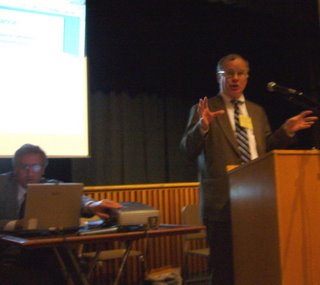Jeopardy

Springfield's in jeopardy, and the Urban Land Institute has been called in to help. The ULI is "the preeminent, multidisciplinary real estate forum" whose mission is "to provide responsible leadership in the use of land to enhance the total environment." For a price, they'll come into a community and make objective recommendations about land use--a pragmatic business plan that cities can choose to implement, or not.
The ULI sends in a team of eight to ten experts from all over the country--a mix of architects, real estate developers, urban planners, and so on. These are people working in the field, not consultants, and they are unpaid. They have no ties to the community, no vested interest in the outcome...about as objective and knowledgeable a group as could be assembled.
Today the group toured the city and met with representatives from city government, industry, and community organizations. Then, in the evening, they held a "town meeting" facilitated by John Mullin, Dean of the Graduate School at UMass, himself an urban planner. As a member of the Library Advisory Council, I received an invitation. Jaded as I am about meetings ostensibly called to get citizens' input, yet intrigued by the Institute's impressive credentials, I did attend.
Mullin outlined the process: in September, the group will convene here for five days. On Monday and Tuesday, they'll interview dozens of people and compile their input. Then they'll brainstorm pretty much around the clock for the next two days, and draft a report. On Friday, they'll present it. A couple of months later, they'll follow up with a hard copy of the final version.
Mullin introduced a couple of ULI members, who explained the mission of their organization. Then Nancy Hadley, Director of the Office of Planning and Economic Development for Bridgeport, Connecticut, spoke eloquently about her city's recent experience with ULI. The rest of the meeting was devoted to an "invitation for dialogue." Two mikes were set up, and attendees were asked to step up and put forward questions they wished the group to consider. Mullin stressed that remarks must be framed as questions, and take no more than a minute.
Carol Baribeau of the Springfield Chamber of Commerce asked how the Connecticut River could be maximized as a resource. Don Silverman of the Indian Orchard Citizens' Council asked the same question about the Chicopee River (which flows past his neighborhood). Sheila McElwaine put in a plug for the Mill River. (At this point, Mullin asked, Are there any more rivers?)
I asked the group to consider how the city's rich history, especially transportation history, could be utilized to make Springfield a destination point. Ben Swan, Jr. brought up blighted buildings; Jeremy Cole, artists and culture; Charlie Knight, a public transportation system. Carol Costa mentioned historical architecture, the riverfront, and asked how the city could develop a "hip factor."
Many other residents took the mike. They advocated for this or that neighborhood, neighborhoods vs. downtown, or expressed their concern about a variety of social problems--crime, homelessness, lack of a skilled workforce, poor educational system. Panel members had to point out in the wrap-up that the ULI's area of expertise was land use, but that a collateral benefit of the type of improvements that they put forth was normally a decrease in other problems. And that cities could, and often did, commission other studies in other areas from other groups.
The auditorium should have been full. It is to be hoped that this initiative will acquire momentum, and that cynical residents will be encouraged to participate. Those who did show up tonight, however, were very engaged.
Engaged, but by and large unable to frame remarks as questions. The facilitator had to ask most of the participants to rephrase their input. In many cases, they could not, and so he had to transform their little disquisitions into questions. If this had been a quiz show, we would have been disqualified in the preliminary round! Let's see if, come September, we know better what to do with the answers.


0 Comments:
Post a Comment
<< Home